 When the Covid lockdown first hit, retail stores closed their doors, and consumers went online to order essential supplies. As the lockdown continued, and parents were running out of ideas of things to do with their kids, many turned to an old favorite that the kids could do independently or with their parents: Legos. The Danish manufacturer saw sales begin to surge as consumers gravitated towards their building sets, which come in a variety of shapes, sizes, difficulties, and characters. The toymaker’s top performing brands included Lego City, Lego Technic, Lego Creator Expert, Lego Harry Potter, and Lego Star Wars. So just how did the pandemic affect Lego’s revenues? According to the company, its annual revenue jumped 27 percent, reaching $55.3 Danish krone, or about $8.06 billion in 20021. This is up from $43.7 Danish krone, or around $6.36 billion in 2020. Lego noted that as it enters its 90th year, it expects its growth rates to normalize and transition back to single-digit growth. On a personal note, we definitely built a lot of Lego sets over the last two years. And now on to this week’s logistics news.
When the Covid lockdown first hit, retail stores closed their doors, and consumers went online to order essential supplies. As the lockdown continued, and parents were running out of ideas of things to do with their kids, many turned to an old favorite that the kids could do independently or with their parents: Legos. The Danish manufacturer saw sales begin to surge as consumers gravitated towards their building sets, which come in a variety of shapes, sizes, difficulties, and characters. The toymaker’s top performing brands included Lego City, Lego Technic, Lego Creator Expert, Lego Harry Potter, and Lego Star Wars. So just how did the pandemic affect Lego’s revenues? According to the company, its annual revenue jumped 27 percent, reaching $55.3 Danish krone, or about $8.06 billion in 20021. This is up from $43.7 Danish krone, or around $6.36 billion in 2020. Lego noted that as it enters its 90th year, it expects its growth rates to normalize and transition back to single-digit growth. On a personal note, we definitely built a lot of Lego sets over the last two years. And now on to this week’s logistics news.
- Amazon is turning grocery-picking gig workers into Whole Foods employees
- Walmart Canada takes aim at last-mile carbon emissions
- Senate passes sweeping bipartisan bill overhauling the US Postal Service
- XPO Logistics to spin off freight brokerage
- Kroger plans another three Ocado e-commerce ‘spokes’
- CEVA Logistics using self-driving trucks to move freight
- ELD vendors ramp up for demand as wireless carriers sunset 3G
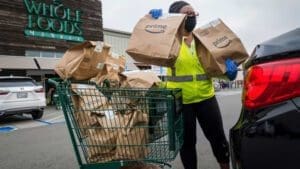 Online grocery shopping has been surging since the Covid pandemic first hit, and companies have been looking for ways to maximize their business. Amazon, which has struggled to streamline its grocery strategy, is looking at grocery-picking gig workers in a new way. The plan, according to a letter to employees, is to bring gig workers on as Whole Foods employees. The letter stated that instead of offering gig work so contractors can pick up and fill batches of grocery orders, workers will become Whole Foods employees with longer shifts. Some gig workers, though, have voiced displeasure with the change. On Reddit, Amazon shoppers, who valued the former role because of its flexibility, are concerned that they won’t have the same freedom as store employees. They also expressed concerns about possibly having to reapply for the job. And for some, picking orders was simply a side gig, not a full-time job. For these people, the switch will have them looking elsewhere.
Online grocery shopping has been surging since the Covid pandemic first hit, and companies have been looking for ways to maximize their business. Amazon, which has struggled to streamline its grocery strategy, is looking at grocery-picking gig workers in a new way. The plan, according to a letter to employees, is to bring gig workers on as Whole Foods employees. The letter stated that instead of offering gig work so contractors can pick up and fill batches of grocery orders, workers will become Whole Foods employees with longer shifts. Some gig workers, though, have voiced displeasure with the change. On Reddit, Amazon shoppers, who valued the former role because of its flexibility, are concerned that they won’t have the same freedom as store employees. They also expressed concerns about possibly having to reapply for the job. And for some, picking orders was simply a side gig, not a full-time job. For these people, the switch will have them looking elsewhere.
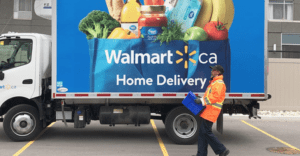 Walmart announced this week that it has become Canada’s first major retailer to offer carbon-neutral last-mile delivery for e-commerce purchases, including online grocery. Plans call for the Walmart-funded program to offset about 25,000 tons of Scope 3 carbon dioxide emissions in its first year. This is the equivalent of taking over 5,000 cars off the road. Walmart is working with EcoCart to calculate and validate the emissions created from online orders sold and shipped by the retailer and to buy carbon-offset credits from sustainability projects in the exact dollar amount required to reduce or avoid those emissions. EcoCart will also provide Walmart with quarterly impact and emissions reporting, which will allow the retailer to track estimated emissions and set benchmarks for third-party carrier partners.
Walmart announced this week that it has become Canada’s first major retailer to offer carbon-neutral last-mile delivery for e-commerce purchases, including online grocery. Plans call for the Walmart-funded program to offset about 25,000 tons of Scope 3 carbon dioxide emissions in its first year. This is the equivalent of taking over 5,000 cars off the road. Walmart is working with EcoCart to calculate and validate the emissions created from online orders sold and shipped by the retailer and to buy carbon-offset credits from sustainability projects in the exact dollar amount required to reduce or avoid those emissions. EcoCart will also provide Walmart with quarterly impact and emissions reporting, which will allow the retailer to track estimated emissions and set benchmarks for third-party carrier partners.
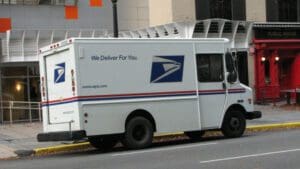 As we have written about ad nauseam, the Postal Service finances have been in shambles for quite a while. Things could be looking up however, as this week, the Senate passed sweeping bipartisan legislation to overhaul the US Postal Service’s finances and allow the agency to modernize its operations. The Postal Service Reform Act, which cleared the House last month by a 342-92 vote, would require retired postal employees to enroll in Medicare when eligible, while dropping a previous mandate that forced the agency to cover its health care costs years in advance. Those two measures would save the USPS nearly $50 billion over the next decade, according to the House Oversight Committee. The legislation would also require the USPS to create an online dashboard with local and national delivery time data. The bill, which was overwhelmingly bipartisan (79-19), now heads to President Biden’s desk for his signature.
As we have written about ad nauseam, the Postal Service finances have been in shambles for quite a while. Things could be looking up however, as this week, the Senate passed sweeping bipartisan legislation to overhaul the US Postal Service’s finances and allow the agency to modernize its operations. The Postal Service Reform Act, which cleared the House last month by a 342-92 vote, would require retired postal employees to enroll in Medicare when eligible, while dropping a previous mandate that forced the agency to cover its health care costs years in advance. Those two measures would save the USPS nearly $50 billion over the next decade, according to the House Oversight Committee. The legislation would also require the USPS to create an online dashboard with local and national delivery time data. The bill, which was overwhelmingly bipartisan (79-19), now heads to President Biden’s desk for his signature.
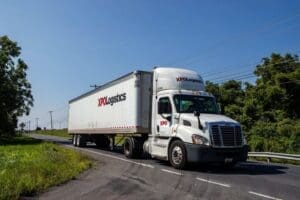 XPO Logistics plans to split its freight brokerage, European, and intermodal businesses apart from its US trucking operation, which will dismantle the large freight and supply-chain operation it has built over the last decade. The company already spun off its contract logistics business last year. Now, it plans to separate its freight brokerage operation, which matches loads from shipping customers to available trucks, into a separate publicly traded company. XPO shareholders would hold shares in that separate business under what XPO said is intended to be a tax-free distribution. XPO will also sell its North American intermodal business, which uses trucks and rail to move shipments, and to exit its European business through a sale or through a separate share listing in Europe. The actions would leave XPO with its North American LTL segment. XPO expects to complete the spinoff by the fourth quarter, subject to various requirements such as refinancing its debt with board approval.
XPO Logistics plans to split its freight brokerage, European, and intermodal businesses apart from its US trucking operation, which will dismantle the large freight and supply-chain operation it has built over the last decade. The company already spun off its contract logistics business last year. Now, it plans to separate its freight brokerage operation, which matches loads from shipping customers to available trucks, into a separate publicly traded company. XPO shareholders would hold shares in that separate business under what XPO said is intended to be a tax-free distribution. XPO will also sell its North American intermodal business, which uses trucks and rail to move shipments, and to exit its European business through a sale or through a separate share listing in Europe. The actions would leave XPO with its North American LTL segment. XPO expects to complete the spinoff by the fourth quarter, subject to various requirements such as refinancing its debt with board approval.
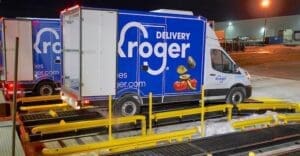 At its 2022 Business Update investor event on Friday in Orlando, FL, supermarket chain Kroger unveiled plans to build three more Ocado-automated “spoke” e-commerce fulfillment facilities to help process online orders. The new spoke sites will be located in Austin and San Antonio, Texas, and Birmingham, Alabama. The new facilities are expected to go into operation later this year and support much bigger Ocado customer fulfillment centers, including one that’s live in the Atlanta area, and another planned for Dallas. The two Texas-based spokes, which Kroger said are pending finalization of lease negotiations, will serve as last-mile cross-dock locations and extend the reach of Kroger Delivery service. The three new spoke sites will mark eight announced so far by Kroger as it continues to expand its footprint in e-commerce while servicing markets where it does not have a physical presence.
At its 2022 Business Update investor event on Friday in Orlando, FL, supermarket chain Kroger unveiled plans to build three more Ocado-automated “spoke” e-commerce fulfillment facilities to help process online orders. The new spoke sites will be located in Austin and San Antonio, Texas, and Birmingham, Alabama. The new facilities are expected to go into operation later this year and support much bigger Ocado customer fulfillment centers, including one that’s live in the Atlanta area, and another planned for Dallas. The two Texas-based spokes, which Kroger said are pending finalization of lease negotiations, will serve as last-mile cross-dock locations and extend the reach of Kroger Delivery service. The three new spoke sites will mark eight announced so far by Kroger as it continues to expand its footprint in e-commerce while servicing markets where it does not have a physical presence.
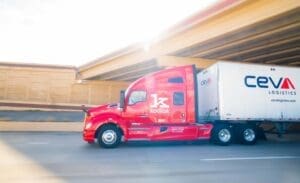 The push for autonomous trucking continues to roll on. In the latest news, CEVA Logistics announced it is working with Kodiak Robotics, a developer of self-driving trucks, to deliver freight autonomously on routes from Dallas-Fort Worth to Austin and from Dallas-Fort Worth to Oklahoma City. Kodiak Robotics has been delivering freight between Dallas-Fort Worth and Houston since mid-2019. Since mid-2021, it also has operated weekly shipments between Dallas-Fort Worth and San Antonio with CEVA Logistics. The partnership expanded last month with a new route between Dallas-Fort Worth and Oklahoma City on the I-35 corridor. This route runs 200 miles between a CEVA facility in Dallas and the delivery point in Oklahoma City. On both routes, a Kodiak autonomous tractor pulls a CEVA trailer filled with consumer products.
The push for autonomous trucking continues to roll on. In the latest news, CEVA Logistics announced it is working with Kodiak Robotics, a developer of self-driving trucks, to deliver freight autonomously on routes from Dallas-Fort Worth to Austin and from Dallas-Fort Worth to Oklahoma City. Kodiak Robotics has been delivering freight between Dallas-Fort Worth and Houston since mid-2019. Since mid-2021, it also has operated weekly shipments between Dallas-Fort Worth and San Antonio with CEVA Logistics. The partnership expanded last month with a new route between Dallas-Fort Worth and Oklahoma City on the I-35 corridor. This route runs 200 miles between a CEVA facility in Dallas and the delivery point in Oklahoma City. On both routes, a Kodiak autonomous tractor pulls a CEVA trailer filled with consumer products.
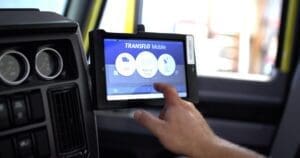 Vendors of electronic logging devices (ELDs) are ramping up production to meet a surge in demand for the telemetry tracking units after wireless data carriers began “sunsetting” their third generation (3G) data networks last month in favor of 4G and 5G technology. Data carriers are making the change to enable the improved bandwidth, latency, and power efficiency of the latest generation platforms, but the switch has a side effect of making the telemetry recorders outmoded and knocking many vehicles out of compliance with a federal mandate to track drivers’ hours of service (HoS). In fact, switching off those 3G networks could leave more than 350,000 U.S. class 8 trucks disconnected from both voice and data services, according to global technology intelligence firm ABI Research.
Vendors of electronic logging devices (ELDs) are ramping up production to meet a surge in demand for the telemetry tracking units after wireless data carriers began “sunsetting” their third generation (3G) data networks last month in favor of 4G and 5G technology. Data carriers are making the change to enable the improved bandwidth, latency, and power efficiency of the latest generation platforms, but the switch has a side effect of making the telemetry recorders outmoded and knocking many vehicles out of compliance with a federal mandate to track drivers’ hours of service (HoS). In fact, switching off those 3G networks could leave more than 350,000 U.S. class 8 trucks disconnected from both voice and data services, according to global technology intelligence firm ABI Research.
That’s all for this week. Enjoy the weekend and the song of the week, Don’t Throw Out My Legos by AJR.

















